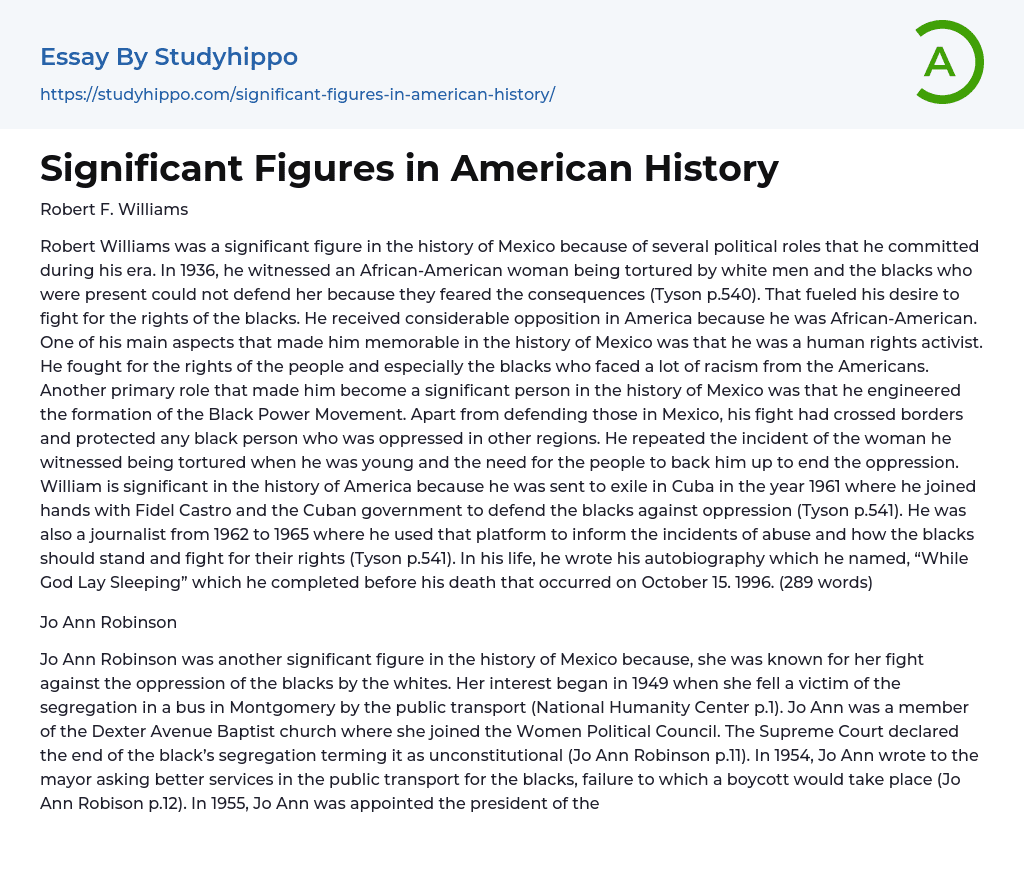Robert F. Williams
Robert Williams was a significant figure in the history of Mexico because of several political roles that he committed during his era. In 1936, he witnessed an African-American woman being tortured by white men and the blacks who were present could not defend her because they feared the consequences (Tyson p.540). That fueled his desire to fight for the rights of the blacks. He received considerable opposition in America because he was African-American. One of his main aspects that made him memorable in the history of Mexico was that he was a human rights activist. He fought for the rights of the people and especially the blacks who faced a lot of racism from the Americans. Another primary role that made him become a significant person in the history of Mexic
...o was that he engineered the formation of the Black Power Movement. Apart from defending those in Mexico, his fight had crossed borders and protected any black person who was oppressed in other regions. He repeated the incident of the woman he witnessed being tortured when he was young and the need for the people to back him up to end the oppression. William is significant in the history of America because he was sent to exile in Cuba in the year 1961 where he joined hands with Fidel Castro and the Cuban government to defend the blacks against oppression (Tyson p.541). He was also a journalist from 1962 to 1965 where he used that platform to inform the incidents of abuse and how the blacks should stand and fight for their rights (Tyson p.541). In his life, he wrote his autobiography whic
he named, “While God Lay Sleeping” which he completed before his death that occurred on October 15. 1996. (289 words)
Jo Ann Robinson
Jo Ann Robinson was another significant figure in the history of Mexico because, she was known for her fight against the oppression of the blacks by the whites. Her interest began in 1949 when she fell a victim of the segregation in a bus in Montgomery by the public transport (National Humanity Center p.1). Jo Ann was a member of the Dexter Avenue Baptist church where she joined the Women Political Council. The Supreme Court declared the end of the black’s segregation terming it as unconstitutional (Jo Ann Robinson p.11). In 1954, Jo Ann wrote to the mayor asking better services in the public transport for the blacks, failure to which a boycott would take place (Jo Ann Robison p.12). In 1955, Jo Ann was appointed the president of the council and her greatest concern was the discrimination of the blacks in the public transportation (Jo Ann Robinson p.10). She organized for a strike for the blacks to decline from using the public means of transport but that was a challenge to many since they never owned cars. The black ministers and their churches supported the bus strike making it a success between 1955 and 1956 (National Humanity Center, p.2). Her actions are significant in the history of Mexico since she was the first black woman to challenge the white oppressive behaviors and attitudes against the blacks. As the leader of the Women Political Council, she used her position to fight for the blacks most of whom fell victims in one way or another
but had no power to challenge the white government. By the end of the bus boycott, the blacks had gained their victory, and there was no more discrimination in the buses. (286 words)
Work Cited
- Tyson, Timothy. Robert F Williams, “Black Power and the Roots of the African American Freedom Struggle. The Journal of American History. 1998. Internet Source. Accessed April 24th 2016. http://www.latinamericanstudies.org/african-americans/JAH-9-1998.pdf
- National Humanities Center.The Montgomery Bus Boycott and the Women who Started it. The Memoir of Jo Ann Gibson Robinson. The Making of African American Identity: Volume III, 1917-1968. Accessed April 24th 2016. http://nationalhumanitiescenter.org/pds/maai3/protest/text5/robinsonbusboycott.pdf
- Jo Ann Robinson. Get Up from There. Get Up from There. N.d. Accessed April 24th 2016. http://www.holidayhouse.com/excerpts/FreedomWalkers.pdf
- Abolitionism essays
- Adam Smith essays
- American History essays
- American Revolution essays
- Ancient Egypt essays
- Articles Of Confederation essays
- Atlantic Slave Trade essays
- Aztec essays
- Benjamin Franklin essays
- Civil Rights Act of 1964 essays
- Civil Rights Movement essays
- Civil war essays
- Cleopatra essays
- French And Indian War essays
- Gettysburg essays
- Great Depression essays
- Hurricane Katrina essays
- Industrial Revolution essays
- Jamestown essays
- Manifest Destiny essays
- Mccarthyism essays
- Patrick Henry essays
- Pearl Harbor essays
- Pocahontas essays
- Prohibition essays
- Pyramids essays
- Salem Witch Trials essays
- Slavery essays
- The New Deal essays
- Thirteen Colonies essays
- Westward Expansion essays
- 1920S essays
- 1950S essays
- 1960S essays
- 19Th Century essays
- 20Th Century essays
- Ancient Greece essays
- Bravery essays
- British Empire essays
- Civilization essays
- Colonialism essays
- Declaration of Independence essays
- Evidence essays
- Genocide essays
- Gilded Age essays
- Historical Figures essays
- Historiography essays
- History of the United States essays
- Letter from Birmingham Jail essays
- Louisiana Purchase essays




